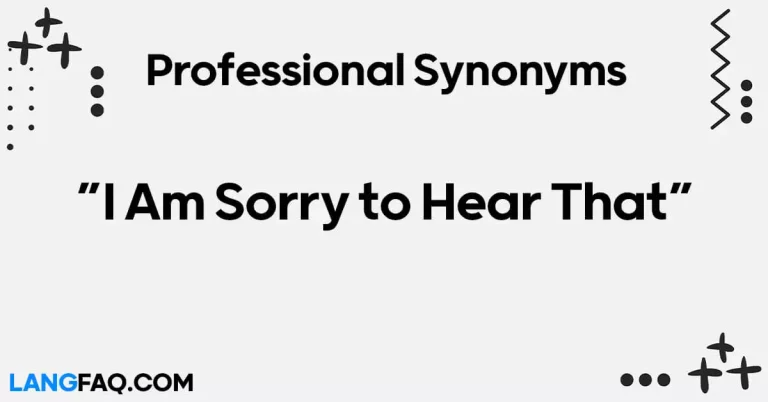Welcome to a linguistic exploration of communication nuances! In this article, we delve into the myriad ways one can convey the sentiment of feeling unheard or unanswered. Effective communication is crucial in every aspect of life, and understanding various expressions can enhance interpersonal skills. So, let’s embark on a journey to discover “12 Other Ways to Say ‘You Didn’t Answer My Question.'”
12 Other Ways to Say “You Didn’t Answer My Question”
Here are 12 alternative ways to express “You Didn’t Answer My Question”:
- Avoided the Issue: Instead of addressing the question directly, the response sidestepped the main point.
- Neglected to Respond: The lack of a direct answer suggested a disregard for the specific inquiry.
- Skirted Around the Question: The response skillfully avoided providing a straightforward answer.
- Danced Around the Topic: Rather than addressing the question head-on, the response circled the main issue.
- Evaded the Query: The individual deliberately avoided giving a clear and direct response to the question.
- Gave a Roundabout Answer: The reply was indirect and didn’t directly tackle the question.
- Overlooked the Matter at Hand: Instead of acknowledging the question, the response seemed to disregard its significance.
- Responded in Circles: The reply lacked clarity, and it felt like going in circles without directly answering.
- Ignored the Inquiry: The question was seemingly disregarded or left unanswered.
- Side-stepped the Issue: Instead of addressing the core question, the response navigated away from the main topic.
- Missed the Point: The response failed to grasp the central aspect of the question.
- Eluded the Question: The person skillfully avoided providing a direct answer or engaging with the inquiry.
Here’s a table with meanings and examples for the 12 alternative ways to say “You Didn’t Answer My Question”:
| Expression | Meaning | Example |
|---|---|---|
| Avoided the Issue | Evaded addressing the main point or question directly. | When asked about the budget, he skillfully avoided the issue. |
| Neglected to Respond | Showed disregard by not providing a direct answer. | Despite repeated inquiries, she neglected to respond to the crucial question. |
| Skirted Around the Question | Deliberately avoided providing a straightforward answer. | His response skated around the question, leaving it unanswered. |
| Danced Around the Topic | Circled the main issue without addressing it directly. | Instead of giving a direct response, she danced around the topic. |
| Evaded the Query | Deliberately avoided giving a clear and direct response. | Frustrated, he noted how the speaker skillfully evaded the query. |
| Gave a Roundabout Answer | Provided an indirect response without addressing the question. | The politician gave a roundabout answer to avoid commitment. |
| Overlooked the Matter at Hand | Disregarded the question or failed to acknowledge its significance. | It seemed as if she intentionally overlooked the matter at hand. |
| Responded in Circles | Replied without clarity, seemingly going in circles. | Instead of a clear answer, the speaker responded in circles, confusing the audience. |
| Ignored the Inquiry | Disregarded or left the question unanswered. | Despite being directly asked, he blatantly ignored the inquiry. |
| Side-stepped the Issue | Navigated away from the main topic or question. | Rather than addressing the issue, he skillfully side-stepped it. |
| Missed the Point | Failed to grasp the central aspect of the question. | It was evident that the response missed the point of the inquiry. |
| Eluded the Question | Skillfully avoided providing a direct answer or engaging with the inquiry. | Her vague response seemed to elude the question posed to her. |
This table presents a diverse array of expressions to convey the frustration of receiving indirect or evasive responses. Whether someone has “danced around the topic” or “overlooked the matter at hand,” these alternatives provide nuanced ways to articulate the sense of not having one’s question directly addressed. By incorporating these phrases into your communication toolkit, you can navigate situations where clarity is paramount, fostering more direct and effective exchanges in both personal and professional interactions.
Is It Correct to Say “You Didn’t Answer My Question”?
Yes, the phrase “You didn’t answer my question” is correct and commonly used to express dissatisfaction or frustration when someone fails to provide a direct or relevant response to a posed question. This expression is straightforward and communicates the speaker’s desire for a more specific and on-point answer. It is suitable for various contexts, both formal and informal, where clarity and directness are important in communication.
Professional Mail Example With “You Didn’t Answer My Question”
Subject: Clarification Needed on [Specific Topic]
Dear [Recipient’s Name],
I trust this message finds you well. I appreciate your prompt response to my previous inquiry. However, I’ve noticed that my specific question regarding [mention the topic] was not directly addressed.
I understand that [insert any considerations or additional context], but I would appreciate it if you could provide more clarity on [restate the specific question]. This information is crucial for [explain the importance or context of the question].
Your attention to this matter is highly valued, and I believe a more detailed response will contribute significantly to [mention any relevant project, task, or objective]. If there are any challenges or uncertainties surrounding my query, please don’t hesitate to let me know so that we can work together to find a suitable resolution.
Thank you for your understanding, and I look forward to receiving the necessary clarification at your earliest convenience.
Best regards,
[Your Full Name] [Your Position] [Your Contact Information]
Dodging the Issue
Dodging the issue is a subtle yet effective way of describing when someone avoids addressing the main point or question directly. This phrase is versatile and can be used in both formal and informal contexts, making it a valuable addition to your communication toolkit.
Scenario: Formal Context (Workplace): In a professional setting, imagine you’re in a team meeting discussing a project timeline. A colleague consistently avoids committing to deadlines or providing clear answers. You might say, “It seems like we’re consistently dodging the issue of setting concrete deadlines for each phase.”
Informal Context (Friends): In a casual conversation with friends about planning a weekend getaway, someone continuously avoids discussing specific details. Lightly, you could say, “We’ve been dodging the issue of choosing a destination for weeks. Let’s make a decision today.”
Example Sentence: “During the board meeting, when pressed about the budget allocation, the CFO skillfully dodged the issue by shifting the focus to future projections.”
Email Sample:
Subject: Clarification on Budget Allocations
Dear [Recipient], I hope this email finds you well. In our recent board meeting, I raised a question about the budget allocation for the upcoming quarter. However, I noticed the response seemed to dodge the issue without providing specific details. Could we schedule a brief meeting to discuss this further and ensure clarity on our financial planning?
Best regards, [Your Name]
Variations:
- Colleagues: Addressing the matter directly
- Friends: Getting to the point
Dictionary Insight: Cambridge Dictionary defines ‘dodge’ as to avoid something, especially by moving quickly.
When and Where to Use: Use “dodging the issue” when you want to convey a deliberate avoidance of addressing a specific point or question. It’s suitable for various contexts, from professional emails to casual conversations.
Pros and Cons: Pros: Conveys frustration without direct confrontation, versatile in different settings. Cons: May be too subtle if a more direct approach is needed.
Related Grammar/Usage Rules: “Dodging the issue” is an idiom, so it’s best used in informal or semi-formal contexts. In formal writing, consider using more direct language.
Exceptions: In highly formal contexts, opt for more professional alternatives like “sidestepping the question” or “avoiding a direct response.”
Tips: Choose this phrase when you want to express dissatisfaction but maintain a relatively neutral tone. It works well when you want to highlight the evasion without escalating the situation.
Skirting the Question
In both formal and informal communication, the phrase “skirting the question” effectively communicates when someone sidesteps or avoids providing a direct answer. Employing this expression adds a touch of formality while conveying the evasion clearly.
Scenario: Formal Context (Meeting with Stakeholders): Imagine you’re in a meeting with stakeholders discussing a project’s challenges. If someone consistently avoids addressing a critical issue, you might say, “It appears that we are consistently skirting the question of the potential risks involved. Let’s delve into this to ensure comprehensive risk mitigation.”
Informal Context (Family Gathering): In a family discussion about planning an event, if someone avoids committing to specific details, you could playfully remark, “We’ve been skirting the question of who’s in charge of decorations. Can we decide that today?”
Example Sentence: “During the interview, when asked about the project delays, the manager skillfully skirted the question by highlighting unrelated achievements.”
Email Sample:
Subject: Clarification on Project Timelines
Dear [Recipient], In our recent project review, I noticed that certain aspects were skirted during the discussion, particularly regarding the timelines and potential delays. Could we schedule a follow-up meeting to address these concerns directly and ensure everyone is on the same page?
Best regards, [Your Name]
Variations:
- Colleagues: Avoiding the main issue
- Friends: Dodging the main point
Dictionary Insight: Merriam-Webster defines ‘skirt’ in a figurative sense as to go or pass around or about (something) in a deliberate way.
When and Where to Use: Use “skirting the question” when you want to highlight someone’s deliberate avoidance of a specific issue. It’s suitable for both formal and informal situations, adapting easily to various contexts.
Pros and Cons: Pros: Conveys evasion with a touch of formality, suitable for professional settings. Cons: May sound a bit more formal than other alternatives, so consider the context.
Related Grammar/Usage Rules: “Skirting the question” is a metaphorical expression, suitable for semi-formal and formal contexts. It might be perceived as too elaborate for very casual conversations.
Exceptions: In extremely casual settings, consider more straightforward phrases like “avoiding the question” or “not addressing the issue.”
Tips: Choose this phrase when you want to maintain a level of professionalism while expressing dissatisfaction with the lack of a direct answer.
Beating Around the Bush
In various contexts, “beating around the bush” perfectly captures the essence of someone avoiding the main point or question. This idiom adds a touch of humor to the conversation, making it suitable for both professional and casual settings.
Scenario: Formal Context (Business Strategy Meeting): Imagine you’re in a meeting discussing the company’s strategic goals. If someone consistently avoids addressing the core objectives, you might humorously remark, “It seems like we’ve been beating around the bush regarding our main goals. Let’s get straight to the point for better clarity.”
Informal Context (Friend Gathering): In a group of friends discussing plans for an upcoming trip, if someone is avoiding making concrete decisions, you could playfully say, “Stop beating around the bush; are you in or out for the adventure?”
Example Sentence: “During the negotiation, rather than discussing the contract terms directly, the client’s representative kept beating around the bush with unrelated anecdotes.”
Email Sample:
Subject: Clarity on Contract Terms
Dear [Recipient], I’ve noticed that in our recent discussions, there has been a tendency to beat around the bush rather than addressing the specific terms of the contract. Could we schedule a meeting to dive into these details and ensure a clear understanding on both ends?
Best regards, [Your Name]
Variations:
- Colleagues: Avoiding the central topic
- Friends: Skirting the main point
Dictionary Insight: Oxford Languages defines ‘beat around the bush’ as to avoid answering a question or saying what you mean.
When and Where to Use: Use “beating around the bush” when you want to inject a bit of humor while pointing out someone’s tendency to avoid addressing the main issue. It works well in various settings.
Pros and Cons: Pros: Adds a humorous touch, suitable for various contexts. Cons: May be perceived as informal, so gauge the formality of the situation.
Related Grammar/Usage Rules: “Beating around the bush” is an idiomatic expression, making it more suitable for casual or semi-formal contexts. Use it judiciously in professional settings.
Exceptions: In extremely formal situations, opt for more direct language like “avoiding the core topic” or “not addressing the main issue.”
Tips: Choose this phrase when you want to convey frustration with a touch of humor, maintaining a relatively light tone in the conversation.
Missing the Point
When it seems like the other person is not addressing the core of your question, expressing it as “missing the point” subtly implies the need for a more direct answer. This phrase is adaptable to various contexts, providing a straightforward way to communicate dissatisfaction.
Scenario: Formal Context (Project Update Meeting): In a project update meeting, if someone consistently provides information unrelated to the project’s key milestones, you might say, “It appears that we’re missing the point regarding the project’s critical milestones. Let’s refocus our discussion on these key aspects.”
Informal Context (Family Discussion): During a family discussion about planning a gathering, if someone is avoiding addressing the logistical details, you could say, “We seem to be missing the point about who’s responsible for coordinating the event. Let’s clarify our roles.”
Example Sentence: “In the press conference, rather than addressing the pressing issues raised by journalists, the spokesperson seemed to miss the point by discussing unrelated achievements.”
Email Sample:
Subject: Clarification Needed on Project Objectives
Dear [Recipient], In our recent project updates, it feels like we’ve been missing the point concerning the project’s core objectives. Could we arrange a meeting to delve deeper into these objectives and ensure everyone is aligned in their understanding?
Best regards, [Your Name]
Variations:
- Colleagues: Overlooking the central aspects
- Friends: Not getting to the heart of the matter
Dictionary Insight: The Cambridge Dictionary defines ‘miss the point’ as to fail to understand the most important part of something.
When and Where to Use: Use “missing the point” when you want to express the perception that someone is not addressing the central aspects of a question or issue. It works well in both formal and informal settings.
Pros and Cons: Pros: Direct and to the point, suitable for various contexts. Cons: May sound a bit formal; consider the context.
Related Grammar/Usage Rules: “Missing the point” is a straightforward expression, making it suitable for both formal and informal communication. Use it when you want to convey direct dissatisfaction.
Exceptions: In extremely casual settings, consider using more casual language like “not getting the main idea” or “ignoring the key issue.”
Tips: Choose this phrase when you want to be direct yet maintain a relatively neutral tone. It effectively conveys the need for a more focused response.
Evading the Issue
In situations where someone skillfully avoids addressing your query, stating they are “evading the issue” brings attention to their avoidance tactics. This phrase is versatile, suitable for both formal and informal contexts, providing a clear way to express dissatisfaction.
Scenario: Formal Context (Budget Discussion in a Board Meeting): During a board meeting discussing the annual budget, if a team member consistently avoids providing specific details, you might assert, “It seems evident that we are dealing with someone evading the issue of budgetary transparency. Let’s address this directly to ensure a thorough understanding.”
Informal Context (Social Gathering): In a social gathering discussing future plans, if someone is avoiding committing to attending an event, you could say, “Stop evading the issue of whether you’ll join us. We need a clear answer for our planning.”
Example Sentence: “When pressed about the project timeline, the manager continued evading the issue by providing vague and unrelated details.”
Email Sample:
Subject: Clarification Needed on Project Timelines
Dear [Recipient], In our recent discussions about project timelines, it appears that certain aspects are being evaded, leading to confusion. Can we schedule a brief meeting to address these concerns directly and ensure we are all on the same page?
Best regards, [Your Name]
Variations:
- Colleagues: Skillfully avoiding the core topic
- Friends: Dodging the central issue
Dictionary Insight: Merriam-Webster defines ‘evade’ as to avoid facing up to.
When and Where to Use: Use “evading the issue” when you want to highlight someone’s skillful avoidance of addressing a specific question or topic. It’s adaptable to various settings, offering a straightforward expression of dissatisfaction.
Pros and Cons: Pros: Conveys evasion clearly, suitable for both formal and informal communication. Cons: May be perceived as somewhat formal, so consider the context.
Related Grammar/Usage Rules: “Evading the issue” is a direct expression, making it suitable for various contexts. Use it when you want to convey dissatisfaction with someone’s avoidance.
Exceptions: In extremely casual settings, consider using more casual language like “dodging the question” or “avoiding the main issue.”
Tips: Choose this phrase when you want to be clear and direct about someone avoiding the central point. It effectively communicates the need for a more focused response.
Going off on a Tangent
Express your frustration when the response seems unrelated to your question by stating that someone is “going off on a tangent.” This phrase humorously points out the diversion from the main topic and can be effectively used in various settings.
Scenario: Formal Context (Business Presentation): During a business presentation, if a speaker consistently veers off into unrelated details rather than addressing the key points, you might diplomatically remark, “It appears we are going off on tangents rather than focusing on the critical aspects of the presentation. Let’s ensure our discussion aligns with the main agenda.”
Informal Context (Group Discussion): In a group discussion among friends about planning an event, if someone consistently introduces unrelated topics, you could playfully say, “We keep going off on tangents; let’s bring the conversation back to the event details.”
Example Sentence: “Instead of addressing the client’s concerns about the project delays, the team lead went off on a tangent discussing the project’s initial stages.”
Email Sample:
Subject: Refocusing Our Discussion on Project Concerns
Dear [Recipient], In our recent project discussions, it seems we’ve been going off on tangents rather than addressing the specific concerns raised. Can we schedule a meeting to refocus our conversation and ensure we address these issues directly?
Best regards, [Your Name]
Variations:
- Colleagues: Veering off into unrelated details
- Friends: Diving into unrelated topics
Dictionary Insight: The Oxford English Dictionary defines ‘tangent’ as departing suddenly from a previous course of action or line of thought.
When and Where to Use: Use “going off on a tangent” when you want to humorously point out someone’s tendency to stray from the main topic. It works well in both formal and informal settings.
Pros and Cons: Pros: Adds humor to the conversation, suitable for various contexts. Cons: May be perceived as informal; consider the context.
Related Grammar/Usage Rules: “Going off on a tangent” is an idiomatic expression, making it more suitable for semi-formal and informal contexts. Use it judiciously in professional settings.
Exceptions: In extremely formal situations, opt for more direct language like “straying from the main topic” or “introducing unrelated details.”
Tips: Choose this phrase when you want to convey frustration with a touch of humor. It effectively communicates the need to refocus on the main discussion.
Circumventing the Question
Highlight the deliberate avoidance of a question by stating that someone is “circumventing the question.” This phrase conveys a sense of directness without aggression, making it suitable for various settings, from formal meetings to casual conversations.
Scenario: Formal Context (Interview Panel): In a job interview, if a candidate consistently avoids answering specific questions about their experience or skills, you might diplomatically note, “It seems we are dealing with circumventing the question during the interview. Let’s ensure we address each query directly for a comprehensive understanding.”
Informal Context (Group Decision Making): During a casual discussion among friends about making group decisions, if someone is avoiding addressing a critical question, you could casually say, “We’re circumventing the question about who’s in charge. Let’s clarify roles for smoother planning.”
Example Sentence: “When questioned about the project’s budget allocation, the manager seemed to be circumventing the question by providing generic information.”
Email Sample:
Subject: Clarification Needed on Budget Allocation
Dear [Recipient], In our recent discussions about the project’s budget, it appears there’s a tendency to circumvent the question, leading to a lack of clarity. Can we schedule a meeting to address these concerns directly and ensure transparency in our financial planning?
Best regards, [Your Name]
Variations:
- Colleagues: Skillfully avoiding the central topic
- Friends: Dancing around the main issue
Dictionary Insight: Merriam-Webster defines ‘circumvent’ as to manage to get around (especially an obstacle) or to find a way of avoiding something.
When and Where to Use: Use “circumventing the question” when you want to express the perception that someone is deliberately avoiding answering a specific question. It’s suitable for both formal and informal situations.
Pros and Cons: Pros: Conveys directness without aggression, adaptable to various contexts. Cons: May sound a bit formal; consider the context.
Related Grammar/Usage Rules: “Circumventing the question” is a straightforward expression, making it suitable for both formal and informal communication. Use it when you want to convey direct dissatisfaction.
Exceptions: In extremely casual settings, consider using more casual language like “dodging the question” or “avoiding the main issue.”
Tips: Choose this phrase when you want to be clear and direct about someone avoiding the central point. It effectively communicates the need for a more focused response.
Overlooking the Matter at Hand
When someone seems to disregard or neglect the core issue, expressing it as “overlooking the matter at hand” conveys a sense of directness while emphasizing the significance of the overlooked topic. This phrase is suitable for both formal and informal communication.
Scenario: Formal Context (Team Project Meeting): In a team project meeting, if a team member consistently overlooks discussing critical project milestones, you might assert, “It’s apparent that we are dealing with someone overlooking the matter at hand. Let’s bring our attention back to the crucial project milestones.”
Informal Context (Family Discussion): During a family discussion about planning an event, if someone is consistently overlooking the logistical details, you could say, “We’re overlooking the matter at hand—specifically, who’s responsible for coordinating the event. Let’s clarify roles for smoother planning.”
Example Sentence: “Instead of addressing the customer’s concerns about service delays, the representative seemed to be overlooking the matter at hand by discussing unrelated features.”
Email Sample:
Subject: Clarification Needed on Service Delays
Dear [Recipient], In our recent discussions about service delays, it’s apparent that certain aspects are being overlooked, leading to customer dissatisfaction. Can we schedule a meeting to address these concerns directly and ensure timely resolutions?
Best regards, [Your Name]
Variations:
- Colleagues: Neglecting the central topic
- Friends: Missing the key issue
Dictionary Insight: The Oxford English Dictionary defines ‘overlook’ as to fail to notice or consider (something).
When and Where to Use: Use “overlooking the matter at hand” when you want to express the perception that someone is neglecting the central aspects of a question or issue. It works well in both formal and informal settings.
Pros and Cons: Pros: Conveys directness while emphasizing the significance of the matter, suitable for various contexts. Cons: May sound a bit formal; consider the context.
Related Grammar/Usage Rules: “Overlooking the matter at hand” is a straightforward expression, making it suitable for both formal and informal communication. Use it when you want to convey direct dissatisfaction.
Exceptions: In extremely casual settings, consider using more casual language like “neglecting the main point” or “ignoring the key issue.”
Tips: Choose this phrase when you want to be clear and direct about someone neglecting the central point. It effectively communicates the need for a more focused response.
Responding in Circles
When faced with responses that lack clarity and seem to go in circles, using the expression “responding in circles” aptly captures the frustration. This phrase is effective in both formal and informal contexts, emphasizing the need for a more direct and straightforward response.
Scenario: Formal Context (Project Status Meeting): In a project status meeting, if a team member consistently responds in circles when asked about project challenges, you might assert, “It’s apparent that we are dealing with someone responding in circles regarding project challenges. Let’s ensure our discussion leads to concrete resolutions.”
Informal Context (Group Discussion): During a casual group discussion about planning an event, if someone is responding in circles about specific details, you could playfully say, “We’re responding in circles about who’s in charge. Let’s cut to the chase and assign responsibilities.”
Example Sentence: “During the audit, when questioned about financial discrepancies, the accountant seemed to be responding in circles, avoiding a direct answer.”
Email Sample:
Subject: Clarity Needed on Financial Discrepancies
Dear [Recipient], In our recent discussions about financial discrepancies, it’s apparent that certain responses are going in circles, leading to confusion. Can we schedule a meeting to address these concerns directly and ensure financial transparency?
Best regards, [Your Name]
Variations:
- Colleagues: Providing vague and circular answers
- Friends: Going around the main issue
Dictionary Insight: Merriam-Webster defines ‘circle’ as a course or series of events or operations that is repeated.
When and Where to Use: Use “responding in circles” when you want to express the frustration of receiving vague and circular answers. It is suitable for both formal and informal settings.
Pros and Cons: Pros: Conveys frustration with lack of clarity, adaptable to various contexts. Cons: May sound a bit formal; consider the context.
Related Grammar/Usage Rules: “Responding in circles” is a direct expression, making it suitable for both formal and informal communication. Use it when you want to convey direct dissatisfaction.
Exceptions: In extremely casual settings, consider using more casual language like “going around the question” or “avoiding the main issue.”
Tips: Choose this phrase when you want to be clear and direct about someone’s tendency to provide vague and circular answers. It effectively communicates the need for a more focused response.
Ignoring the Inquiry
When someone blatantly disregards or neglects a direct question, expressing it as “ignoring the inquiry” highlights the frustration of not receiving a response. This phrase is versatile, suitable for both formal and informal communication, providing a clear way to express dissatisfaction.
Scenario: Formal Context (Client Meeting): During a client meeting, if a team member consistently ignores client inquiries about project progress, you might diplomatically assert, “It appears we are dealing with someone ignoring the client’s inquiries. Let’s ensure we address each query promptly for client satisfaction.”
Informal Context (Family Discussion): In a family discussion about planning an event, if someone is consistently ignoring questions about their contribution, you could say, “We’re ignoring the inquiries about who’s responsible for what. Let’s clarify roles for smoother planning.”
Example Sentence: “When asked about the implementation timeline, the project manager seemed to be ignoring the inquiry, focusing on unrelated details instead.”
Email Sample:
Subject: Urgent: Clarification Needed on Implementation Timeline
Dear [Recipient], In our recent discussions about the project’s implementation timeline, it’s apparent that certain aspects are being ignored, leading to uncertainty. Can we schedule a meeting to address these concerns directly and ensure a clear understanding of our timelines?
Best regards, [Your Name]
Variations:
- Colleagues: Neglecting to address the central topic
- Friends: Disregarding the main issue
Dictionary Insight: Oxford Languages defines ‘ignore’ as to refuse to take notice of or acknowledge; disregard intentionally.
When and Where to Use: Use “ignoring the inquiry” when you want to express the perception that someone is deliberately neglecting or disregarding a specific question. It’s adaptable to both formal and informal settings.
Pros and Cons: Pros: Conveys directness without aggression, suitable for various contexts. Cons: May sound a bit formal; consider the context.
Related Grammar/Usage Rules: “Ignoring the inquiry” is a straightforward expression, making it suitable for both formal and informal communication. Use it when you want to convey direct dissatisfaction.
Exceptions: In extremely casual settings, consider using more casual language like “avoiding the question” or “not addressing the issue.”
Tips: Choose this phrase when you want to be clear and direct about someone deliberately neglecting a central point. It effectively communicates the need for a more focused response.
Skimming Over the Question
When faced with responses that seem to skim over the actual question, expressing it as “skimming over the question” aptly captures the frustration of not getting a direct answer. This phrase is effective in both formal and informal contexts, emphasizing the need for a more specific and relevant response.
Scenario: Formal Context (Board Discussion): In a board discussion about financial projections, if a board member consistently skims over specific budget-related inquiries, you might assert, “It’s evident that we are dealing with someone skimming over the question about budget details. Let’s delve into the specifics for better financial planning.”
Informal Context (Group Decision Making): During a group discussion among friends about organizing an event, if someone is skimming over details about their responsibilities, you could playfully say, “We’re skimming over the question of who’s handling what. Let’s get into the specifics for smoother planning.”
Example Sentence: “When questioned about the product’s pricing strategy, the marketing manager seemed to be skimming over the question, emphasizing general market trends instead.”
Email Sample:
Subject: Clarification Needed on Product Pricing
Dear [Recipient], In our recent discussions about the product’s pricing strategy, it seems there’s a tendency to skim over specific details, leading to uncertainty. Can we schedule a meeting to address these concerns directly and ensure clarity on our pricing approach?
Best regards, [Your Name]
Variations:
- Colleagues: Quickly passing over the central topic
- Friends: Briefly touching on the main issue
Dictionary Insight: The Merriam-Webster Dictionary defines ‘skim over’ as to pass over (a surface) rapidly.
When and Where to Use: Use “skimming over the question” when you want to express the perception that someone is quickly passing over a specific question without providing detailed information. It works well in both formal and informal settings.
Pros and Cons: Pros: Conveys directness without aggression, adaptable to various contexts. Cons: May sound a bit formal; consider the context.
Related Grammar/Usage Rules: “Skimming over the question” is a straightforward expression, making it suitable for both formal and informal communication. Use it when you want to convey direct dissatisfaction.
Exceptions: In extremely casual settings, consider using more casual language like “brushing off the question” or “not addressing the issue directly.”
Tips: Choose this phrase when you want to be clear and direct about someone quickly passing over a specific point. It effectively communicates the need for a more detailed response.
Dodging the Query
When met with responses that seem to sidestep the actual question, expressing it as “dodging the query” effectively communicates the frustration of not receiving a direct response. This phrase is versatile, suitable for both formal and informal communication, emphasizing the importance of addressing the specific inquiry.
Scenario: Formal Context (Client Consultation): During a client consultation, if a team member consistently dodges specific inquiries about project timelines, you might diplomatically assert, “It’s evident that we are dealing with someone dodging the client’s queries about project timelines. Let’s ensure we provide clear and direct answers for client satisfaction.”
Informal Context (Family Discussion): In a family discussion about planning an event, if someone is consistently dodging questions about their availability, you could say, “We’re dodging the query about who’s attending. Let’s get straight answers for better planning.”
Example Sentence: “When pressed about the delivery delays, the supplier seemed to be dodging the query, citing external factors rather than addressing the specific issues.”
Email Sample:
Subject: Urgent: Clarification Needed on Delivery Timelines
Dear [Recipient], In our recent discussions about delivery delays, it appears there’s a tendency to dodge the query, leading to customer dissatisfaction. Can we schedule a meeting to address these concerns directly and ensure a clear understanding of our delivery timelines?
Best regards, [Your Name]
Variations:
- Colleagues: Skillfully avoiding the central topic
- Friends: Evading the main issue
Dictionary Insight: The Oxford English Dictionary defines ‘dodge’ as to avoid (someone or something) by a sudden quick movement.
When and Where to Use: Use “dodging the query” when you want to express the perception that someone is skillfully avoiding addressing a specific question. It’s adaptable to both formal and informal settings.
Pros and Cons: Pros: Conveys directness without aggression, suitable for various contexts. Cons: May sound a bit formal; consider the context.
Related Grammar/Usage Rules: “Dodging the query” is a straightforward expression, making it suitable for both formal and informal communication. Use it when you want to convey direct dissatisfaction.
Exceptions: In extremely casual settings, consider using more casual language like “avoiding the question” or “not addressing the issue.”
Tips: Choose this phrase when you want to be clear and direct about someone skillfully avoiding a central point. It effectively communicates the need for a more focused response.
Beating Around the Bush
When faced with responses that seem to avoid the heart of the matter, expressing it as “beating around the bush” aptly captures the frustration of not getting a direct answer. This phrase is effective in both formal and informal contexts, emphasizing the need for a more straightforward and pertinent response.
Scenario: Formal Context (Team Strategy Meeting): In a team strategy meeting, if a team member consistently beats around the bush when asked about specific tactics, you might assert, “It’s evident that we are dealing with someone beating around the bush regarding our strategic approach. Let’s ensure we address each aspect directly for a more effective plan.”
Informal Context (Friend Discussion): During a casual discussion among friends about making plans, if someone is beating around the bush regarding their availability, you could playfully say, “We’re beating around the bush about who’s joining. Let’s get clear answers for better planning.”
Example Sentence: “When questioned about the project’s feasibility, the manager seemed to be beating around the bush, discussing unrelated aspects rather than addressing the specific concerns.”
Email Sample:
Subject: Urgent: Clear Insight Needed on Project Feasibility
Dear [Recipient], In our recent discussions about the project’s feasibility, it appears there’s a tendency to beat around the bush, leading to uncertainty. Can we schedule a meeting to address these concerns directly and ensure a comprehensive understanding of our project’s potential?
Best regards, [Your Name]
Variations:
- Colleagues: Deliberately avoiding the central topic
- Friends: Not getting to the heart of the matter
Dictionary Insight: The Cambridge Dictionary defines ‘beat around the bush’ as to avoid talking about what is important.
When and Where to Use: Use “beating around the bush” when you want to express the perception that someone is avoiding addressing the crucial aspects of a question or issue. It works well in both formal and informal settings.
Pros and Cons: Pros: Conveys directness with a touch of informality, suitable for various contexts. Cons: May sound somewhat informal; consider the context.
Related Grammar/Usage Rules: “Beating around the bush” is an idiomatic expression, making it more suitable for semi-formal and informal contexts. Use it judiciously in professional settings.
Exceptions: In extremely formal situations, opt for more direct language like “avoiding the main issue” or “not addressing the key concern.”
Tips: Choose this phrase when you want to be clear and direct about someone avoiding the central point. It effectively communicates the need for a more focused response.
FAQs
Is it okay to use these expressions in a professional setting?
Absolutely, these expressions can be used in various settings, but it’s essential to gauge the formality of the situation. In professional environments, opt for more neutral phrases.
How can I encourage someone to provide a direct answer?
Politely rephrase your question, emphasizing the need for a straightforward response. Clear communication is often achieved through effective articulation.
Are these phrases universally understood?
While English speakers commonly use these expressions, cultural nuances may affect interpretation. Consider the context and your audience.
Should I confront someone using these phrases?
Use them judiciously; they convey frustration without direct confrontation. Choose the phrase that best suits the situation and your relationship with the person.
Can these expressions be used in writing?
Certainly! These phrases are versatile and can be applied in written communication to convey a similar sentiment of frustration or evasion.
How can I avoid being misunderstood when using these expressions?
Context is key. Ensure that the situation warrants such expressions, and consider the relationship dynamics to prevent misunderstandings.
Conclusion
Effective communication involves navigating the subtleties of language. “12 Other Ways to Say ‘You Didn’t Answer My Question'” equips you with diverse expressions to articulate your feelings when responses fall short. Enhance your communication toolkit and foster clearer exchanges in both personal and professional spheres.







